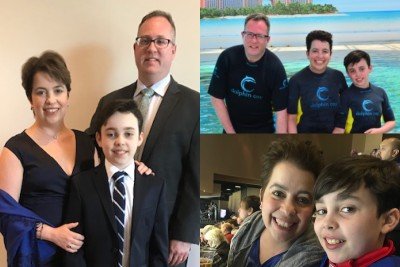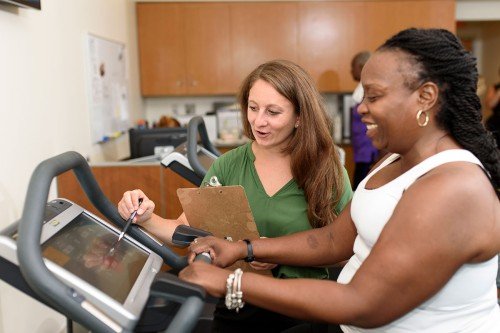When the Doctor’s Orders Include Exercise: Nicole’s Story
When Nicole Grogan, a busy working mother, was diagnosed with stage II breast cancer, she knew she would do everything she could to get better. So when her doctor asked, she agreed to participate in a clinical trial looking at the benefit of exercise during treatment for breast cancer.

After treatment for breast cancer and a clinical trial evaluating the benefits of exercise, Nicole is back to her busy schedule as a working mother.
Nicole Grogan was 44 years old in September 2017 when she was diagnosed with stage II breast cancer. She’d had a mammogram and biopsy at a hospital in Manhattan. But after the diagnosis, one of her close friends, Debra Rodrigue, advised Nicole to go to Memorial Sloan Kettering for treatment. Ms. Rodrigue is a clinical nurse at MSK.
“I called on a Friday morning, and by the following Wednesday I was sitting down with [breast surgeon] Andrea Barrio, who already had all of my test results,” says Nicole, who lives in Manhattan and works in the financial industry.
Because Nicole had two tumors in the same breast, Dr. Barrio recommended a mastectomy. Nicole chose to have both breasts removed, followed by breast reconstruction. Her surgery took place at the Josie Robertson Surgery Center in October 2017.
At her follow-up appointment about two weeks later, Dr. Barrio told Nicole that her medical oncologist would be Ayca Gucalp and her radiation oncologist would be Oren Cahlon. Nicole felt comfortable with her team.
“The first time I sat down with Dr. Gucalp, I knew she was one of the most brilliant people I’d ever met,” Nicole says. “She walked me through the science of my cancer and explained everything that was going to happen with my treatment. Then she told me she thought I’d be a good candidate for a clinical trial looking at the benefits of exercise during and after breast cancer treatment.”
Analyzing the Benefits of Exercise
The purpose of the trial, which is still ongoing, is to determine whether regular exercise can reduce the heightened risk of cardiovascular disease that’s often seen after treatment for early-stage breast cancer. This increased risk is caused by certain drugs, such as a type of chemotherapy called anthracyclines and the targeted therapy trastuzumab (Herceptin®). Nicole received an anthracycline drug called doxorubicin as part of her chemotherapy.
Most people who are treated for early-stage breast cancer are worried about the cancer coming back (recurrence), says exercise oncologist Jessica Scott, who is the principal investigator for the trial. “The fear of recurrence is understandable,” she says, “but another very important concern is the increased risk of cardiovascular disease in these patients. Because exercise has shown great promise in reducing the risk of heart disease in general, we decided to look at exercise in women who are undergoing treatment for breast cancer.”
Nicole was eager to join the study. Although her husband had concerns about her taking on additional responsibilities during treatment, Nicole was confident that she could manage them.
“From the moment I was diagnosed, I knew I would do everything I could to get better,” she says. “My 10-year-old son needed me. At the same time, I kind of selfishly thought, This is great. I’m going to have a trainer, and I’m going to get in shape.”
Decoding the Outcomes of an Exercise Trial
The trial has four groups. The first group of participants completes supervised exercise while receiving chemotherapy, the second completes supervised exercise immediately after chemotherapy, the third completes supervised exercise during and after therapy, and the fourth is given an unsupervised physical activity program with a Fitbit to track activity levels. The supervised exercise groups complete 20 to 60 minutes of treadmill exercise three days per week. Nicole was in the group that exercised during chemotherapy.
Before starting the trial, Nicole had baseline studies and stress tests to look at how well her heart worked. Prior to her cancer diagnosis, a busy job and home life kept her from regular gym visits. But during her time on the trial, which lasted almost a year, she came to MSK three times a week to exercise with a member of Dr. Scott’s team.
“I came out of the trial with better numbers than when I started,” Nicole says. “This was despite having undergone chemo and radiation. I was on that treadmill mile after mile.”
She is confident that regular exercise helped her body work at its best during intensive cancer treatment. “I think I was able to function so well during treatment because of the exercise,” she says.
In addition to helping her feel better physically, Nicole says the trial also benefitted her mental health. “I had this incredible team there every day to get me through,” she says. “When I had rough days, they made me feel supported.”
Dr. Scott says that developing those relationships is an important facet of the trial. “The participants are not only exercising their muscles and their hearts. They are also getting face-to-face time with our exercise physiologists,” Dr. Scott says. “As part of this study, we are assessing how patients feel — which we call patient-reported outcomes — as well. This is so we will be able to quantify whether there are improvements in quality of life.”
Today, Nicole is back to her busy schedule as a working mother — traveling for her job, attending her son’s hockey games, and going on vacations with friends and family. At her most recent appointment in July 2019, she had no evidence of disease.
“MSK is a special place, and I feel so lucky,” she says. “I know that not everybody has the same outcome I had, but I feel it’s important to tell everyone about my experience and the way this trial changed my life.”








